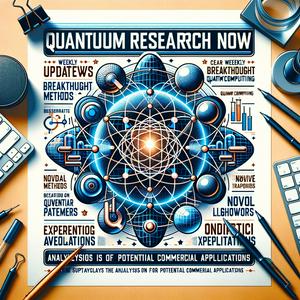This is your Quantum Research Now podcast.
Imagine this: a Finnish quantum powerhouse, IQM Quantum Computers, just announced it's merging with Real Asset Acquisition Corp to go public on the US markets at a staggering $1.8 billion valuation, as reported by Reuters and The Quantum Insider today. That's not just headlines—it's the thunderclap signaling quantum's leap from labs to Wall Street.
Hello, I'm Leo, your Learning Enhanced Operator, diving deep into the quantum realm on Quantum Research Now. Picture me in the humming cryostat chamber at Inception Point, where superconducting qubits dance at near-absolute zero, their Josephson junctions pulsing like synchronized heartbeats in the void. The air smells of liquid helium's faint metallic tang, and faint vibrations from dilution fridges whisper secrets of entanglement.
This IQM move means everything for computing's future. They're injecting over $450 million to rocket toward fault-tolerant systems—full-stack, on-premise beasts with their own chip fabs and software stacks. Think of it like upgrading from a bicycle to a hyperloop: classical computers chug bit by bit, linearly. IQM's superconducting qubits, entangled in superposition, explore countless paths simultaneously, like a million chess grandmasters pondering every possible move at once. Their vertical integration slashes innovation cycles, delivering more on-premises systems than rivals like IBM or IonQ, straight to elite labs. It's the tipping point where quantum cracks real-world nuts—optimizing logistics that cripple global supply chains, simulating molecules for drugs that classical supercomputers can't touch, or shattering encryption faster than a vault door under a diamond drill.
Let me paint a quantum concept with drama: envision a Kitaev minimal chain, Lego-like quantum dots bridged by superconductors, birthing Majorana zero modes. These ghostly particles store info not in one spot, but smeared across paired states, armored against noise like a vault dispersing gold across hidden chambers. Recent breakthroughs from CSIC and Delft read their parity in real-time via quantum capacitance—a global probe piercing the fog. IQM's cash will scale this resilience, turning fleeting milliseconds of coherence into hours, making error-corrected quantum processors viable.
Meanwhile, TII in Abu Dhabi launched cloud access to their 5-to-25 qubit superconducting QPUs today, coherence times tenfold better, echoing real-time qubit tracking from Copenhagen's Niels Bohr Institute last week—FPGAs chasing fluctuations 100 times faster, spotting "good" qubits turning rogue in milliseconds.
Quantum's race is on, mirroring today's geopolitical scrambles: nations funding like Australia's demos or India's resilience roadmap, all chasing the fault-tolerant horizon. IQM's IPO? It's the spark igniting hybrid quantum-classical revolutions, from secure comms to materials forged in simulation.
Thanks for joining me, listeners. Questions or topic ideas? Email
[email protected]. Subscribe to Quantum Research Now, a Quiet Please Production—visit quietplease.ai for more.
(Word count: 448; Character count: 3392)
For more http://www.quietplease.ai
Get the best deals https://amzn.to/3ODvOta
This content was created in partnership and with the help of Artificial Intelligence AI


